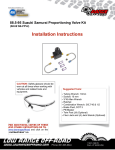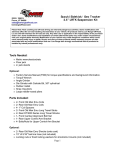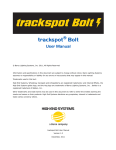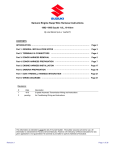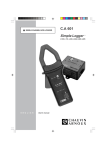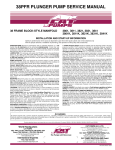Download STC-UO_Samurai Updated Transfer Case Front Output Shaft
Transcript
Instructions Created by an: Samurai Updated Transfer Case Front Output Shaft (SKU# STC-UO) Installation Instructions Suggested Tools: CAUTION: Safety glasses should be worn at all times when working with vehicles and related tools and equipment. For additional copies of these and other instructions go to: www.lowrangeoffroad and click on the “Instructions” tab. • • • • • • • • • • • • • • • • • • • • Brake Cleaner Scotch-Brite Pad (or Fine Emory Cloth) Twin Post Lift (or Floor Jack and 4 Jack stands) (2) 12 mm Box End Wrenches 3/8” Drive Deep Socket: 12mm 3/8” Drive Torque Wrench 1/2” Drive Torque Wrench 1/2” Drive Sockets: 12, 24 & 27mm Impact Wrench, 1/2” drive (Optional) 1/2” Drive Impact Socket: 27mm (Optional) Dead Blow Hammer Small Sledge Hammer Gear Puller- 3 Jaw (2 Jaw Would Work) Socket and Ratchet to fit Gear Puller Seal Puller (or Larger Standard Screwdriver) Wheel Bearing Grease Square Nose Cold Chisel (or Punch) Bearing Grease 80 W 90 Gear Oil Magnetic Pickup Tool (Magnet on a stick) Lifting and Supporting the Vehicle Lifting Option 1 Lift and support the vehicle on a twin post lift. CAUTION: Always follow the safety guidelines associated with the lift you are using. Front Support Location Rear Support Location Lifting Option 2 We used a twin post lift for these instructions, but this job could also be done with a floor jack and (4) safety stands. Front Floor Jack Rear Floor Jack Tech Tip Step 1 When working on suspension, brakes or drive train parts it is a good idea to spray all fasteners with penetrating oil before removal. We recommend a day ahead if possible. If not done a day ahead, an hour or even minutes before is helpful. Position a drain pan under the transfer case. Step 2 Remove the drain plug using a 24mm socket. After the oil has drained reinstall the drain plug and tighten 13.5 to 20 ft. lbs. Removing The Drive Shaft Front Driveline From Transfer Case To Front Differential Bolt Nut Lock Washer Step 3 Disconnect the front drive shaft at the transfer case by removing all 4 bolts using two 12mm box end wrenches. (See Figure A) Note: It is helpful to place the transfer case shifter in “2H” position so you can rotate the shaft allowing easier access to the remaining bolts. Figure A Step 4 Disconnect the other end of the drive shaft by removing the (4) bolts using two 12 mm box end wrenches. Step 5 Step 6 It may be necessary to tap the drive shaft using a hammer to jar it free from the differential flange. Remove the drive shaft and set it aside. Shifter Parts Shifter Lever Shifter Lever Boot Shifter Lever Boot Retainer Shifter Lever Lock Shifter Lever Shifter Lever Ball Shifter Lever Spring Disconnecting The Shifter Step 7 Step 8 Release the boot retainer by pushing the 2 tabs together and slide the boot up the shifter lever. Disconnect the shifter lever by depressing the shifter retainer and turning it counter clockwise. (See Figure B) Figure B Step 9 Illustration showing shift lever guide removal procedure. Disconnect the shifter lever from the transfer case by pulling up on the shifter lever. Step 10 Position the shifter lever up out of the way as shown here. Transfer Case Parts Shifter Bushing Front Housing Gasket Center Housing Rear Housing Front Housing Front Housing Bolts (7 ea.) Check and Fill Plug Drain Plug 4 Wheel Drive Switch Ball 4 Wheel Drive Switch Removing the 4Wheel Drive Indicator Switch Assembly Step 11 Step 12 Disconnect the 4wheel drive indicator wire. Simply lift UP on the tab and pull the connector halves apart. Remove the 4Wheel drive indicator switch using a 21mm open (or adjustable) end wrench. Step 13 Remove the four wheel drive switch ball using a small magnet pickup tool or small magnetic screwdriver. Caution: Failure to remove this ball at this point in the procedures may result in loosing the ball down inside the transfer case when the front housing is removed. Removing the Front Housing Step 14 Place the transfer case in 4H and remove the front output flange nut using a 27mm socket and breaker bar. Be sure to turn the nut in a counter clockwise direction. Tech Tip 14 If you have a 1/2” drive impact wrench (electric or pneumatic) and a 27mm impact socket, this works very well. Note: It may be necessary to hit the breaker bar with a hammer to get the nut to break loose. Step 15 Step 16 Remove the output flange nut. Remove the output flange washer. Tab Step 17 Remove the (7) front housing bolts using a 12mm box end wrench or socket. Step 18 Jar the front output housing loose by tapping it with a dead blow hammer on the tab as shown here. Note: There are 3 different length bolts holding this housing on. Be sure to note their location so they can be reinstalled in the correct locations. Pilot Bearing Step 20 Step 19 Remove the front housing and set it aside. Inspect the output shaft pilot bearing. If it is scored, discolored (blue or brown) or has cage damage it should be replaced. Click HERE for this bearing and many other transfer case parts. Inspect Here Step 21 Step 22 Inspect the output shaft bearing by rotating output shaft and flange. It should turn smoothly with no binding. It should not allow the shaft to move up and down or in and out. If any problems including looseness is felt, the bearing will need replacing. We will show you when and how this is done later. Inspect the part of the output shaft that fit inside the pilot bearing. Even though we will be replacing this shaft, if the old shaft (shown here) has discoloration, scoring or wear of any kind you should replace the pilot bearing along with the output shaft. Front Output Shaft Parts Output Shaft Seal Output Shaft Output Flange Output Flange Washer Output Flange Nut Output Shaft Pilot Bearing Output Shaft Bearing Output Shaft Snap Ring Inspect Here Step 23 Remove the front housing gasket. This gasket will need to be replaced. It is a specified thickness that maintains specified tolerances inside the transfer case and should not be substituted with silicone gasket maker or sealer of any kind. Click HERE for this gasket and many other transfer case parts. Step 25 Remove the output flange by striking it with a dead blow (or brass) hammer as shown. If this method is unsuccessful, see the next step. Step 24 Inspect the front output housing where the shifter rods are positioned. If there is excessive wear, the front output housing will need replacing. Step 26 Skip this step if the flange came off in the previous step. If the flange did not come off in the previous step you will need to use a three jaw puller as shown here. Seal Groove Step 27 Step 28 Remove the flange. Inspect the flange seal surface for grooving. Note: If you can feel a groove with your finger nail you may need to replace this part. Tech Tip 28 A Some flange seal surfaces can be improved by cleaning them with a Scotch Bright pad. Tech Tip 28 B This is the hub sealing surface after being cleaned with a Scotch Bright pad. Notice the groove is no longer visable. (See Step 28) This flange is reusable. Removing the Front Output Shaft Step 29 Tech Tip 29 Support the front housing in one hand and strike sharply the front output shaft with a dead blow hammer. It will take several sharp blows to remove the shaft. If the output shaft will not come out using a dead blow hammer, it may be necessary to use a small sledge hammer. This is okay here because we are replacing the shaft. You would not want to strike this shaft with a hard hammer if you wanted to reuse the shaft. Using a hard hammer damages the threads and the flange nut will not reinstall. Caution: Glasses. Be sure to wear Safety Pry Here Step 30 Continue pounding until the shaft comes out of the housing. Step 31 Remove the output shaft seal using a seal puller or large standard screwdriver. Chamfer Step 32 Step 33 If the bearing is good, skip this step. If the bearing was determined to be bad now is the time to replace it. Remove the snap ring, press the bearing out in the direction of the snap ring groove, press in the new bearing and reinstall the snap ring. When pressing in a new bearing be sure to press against the outside bearing race. Clean the seal chamfered surface using a standard screwdriver (or putty knife) to make sure the seal slides into place easily. Caution: Do not gouge the aluminum. Installing the Front Output Seal Step 34 Tech Tip 34 Position the new seal as shown. The garter spring goes down (or toward the fluid being sealed). Note: This seal is not supplied with the front output shaft. Click HERE for this seal and many other transfer case parts. Chamfer Step 35 Tap the seal into place using a hammer. Note: The seal must be driven in evenly. It may be helpful to use a socket that is a little smaller than the outside diameter of the seal. Place the socket on the seal and tap the socket driving the seal into place. Tech Tip 35 The seal is properly installed when it is just below the chamfer. Installing the Front Output Shaft Step 36 Clean the output shaft using a good degreasing solvent such as brake cleaner or something similar. Step 37 Place the front output shaft through the bearing as shown here. Step 38 Step 39 Place an 18 mm standard socket over the shaft to protect it and support the front housing in your hand . . . . . . . then strike the socket sharply, using a dead blow hammer, driving the input shaft into the bearing. Continue striking the socket (and shaft) until the shaft is seated all the way into the bearing. Figure C Tech Tip 39 A The Suzuki Samurai service manual recommends what is shown above as an alternative way of installing the front output shaft into the bearing. You could substitute tool (A) with a 1/2” driver 18 mm standard socket. (See Figure C) Tech Tip 39 B Using a flash light, look down between the teeth and the front housing to see that the shaft is all the way in. Installing the Shifter Bushing Step 40 Remove and inspect the shifter bushing. It should be pliable and not cracked, hardened or damaged in any way. If it is damaged it should be replaced. For a replacement part click HERE. If the shifter bushing is in good shape, reinstall it. Important Notice: Even if the shifter bushing appears to be in good shape, we recommend replacing it with one of our upgraded Nylatron shifter bushings. Especially, if you are experiencing looseness in your transfer case shifter. This looseness is common in many Suzuki Samurais. This newly designed part is guaranteed to solve part, and perhaps even all the loose shifter problem. Installing the LROR Nylatron Shifter Bushing If you are not replacing the shifter bushing skip to the next section. Step 41 Wipe the shifter bushing area clean. Note: To see a YouTube Video of how to install this shifter bushing click HERE. Or you could continue to the next step. Step 42 Turn the bushing upside-down, align the (2) grooves in the bushing with the (2) pins in the housing and install the bushing on the pins. Step 43 Tech Tip 43 Rotate the bushing, using the pins as a pivot, 180° or until the bushing drops into place. This shows the shifter bushing properly installed. Installing the Front Output Flange Step 44 Step 45 Apply some grease to the seal surface of the flange. Install the flange on the output shaft. Note: This is to lubricate the seal. Step 46 Leave the washer and nut off for now. Installing the Shifter Lever Groove Sides Step 47 Step 47 Continued Clean and inspect the shifter ball. It should be uniformly rounded with no flat spots or scoring. The sides of both grooves should be straight with no wear. If wear is observed the shifter lever should be replaced. Note: Some have found success with filing the groove and getting it close to its original shape. This can only be done if the damage is minor. Step 48 If the shifter is being reused, clean the ball area with a Scotch Bright pad or some very fine emery cloth. Step 49 Push the shifter back up out of the way for now. Installing the Front Housing Step 50 Step 51 Wipe the mating surface of the center housing with a cloth. Be sure this area is free of any dirt, grit, old gasket, gasket sealer, etc. Place a small amount of wheel bearing grease on the pilot bearing surface of the output shaft. Step 52 Step 53 Place a new gasket on the front housing. Insure that the gasket is aligned with the (2) alignment pins and that the holes in the gasket align with the holes in the housing. Install the front housing on the middle housing. Be sure the shifter rods are properly positioned in the support holes and that the output shaft fits into pilot bearing. Step 54 Continue installing the front housing until it fits against the center housing. There should be no gap between the housings. Caution: Do NOT force these two parts together. If they do not go together easily, remove the front housing and check for obstructions. Step 55 Install and hand tighten the (7) front housing bolts making sure the bolts are located in their original locations. (See Next Tech Tip) Medium Bolts Short Bolts Long Bolts Tech Tip 55 Bolt length placement. Step 56 Torque the bolts in an increasingly tighter criss-cross pattern until 9.5 to 16.5 ft. lbs. is reached. Installing the 4Wheel Drive Indicator Assembly Step 57 Step 58 Install the 4Wheel drive indicator ball. Install and tighten the 4Wheel drive indicator switch. Step 59 Plug in the 4Wheel drive indicator connector. Note 1: Push the coupler halves together until they snaps onto place. Note 2: Be sure the wires are routed properly and secure. Installing the Shifter Lever Step 60 Install the shifter lever. Be sure to align the grooves of the ball with the pins in the housing and the lower shift lever with the shifting rods. Note: It may take a bit of work to get the lever to align with the shifter rods. Be patient but persistent. It will go into place. Step 61 Slide the spring down into place and position the shift lever retainer grooves with the pins inside the front housing and . . . Step 62 . . . press down on the shift lever retainer and lock it into place by rotating it clockwise. Step 63 Step 64 Slide the boot back into place. Reposition the boot retainer. Step 65 Place the shifter in 4H. Note: This is done so the flange nut can be torqued more easily. Installing the Front Drive Shaft Assembly Step 66 Step 67 Install the washer and flange nut. Torque the flange nut 80 to 108 ft. lbs. Note: We recommend using a new flange nut if possible. Click HERE to purchase a new flange nut from Low Range Off-Road. Step 68 Tech Tip 68 Stake the nut collar using a hammer and punch in 2 locations. Flange nut properly staked. Step 69 Position the front of the drive shaft on the front differential flange and install the (4) bolts, lock washers, and nuts. Tighten the nuts 17 to 21.5 ft. lbs. Step 70 Connect the other end of the drive shaft to the transfer case output flange. Tighten the nuts 17 to 21.5 ft. lbs. Note: Be sure to reinstall the drive line spacer if removed earlier. Refilling and Final Testing Step 71 Remove the check and fill plug using a 27mm socket Note: Be sure the DRAIN plug is installed and tight. Step 72 Add 80W90 Gear Oil until fluid begins to run out; and quickly reinstall the plug. Tighten the plug 13.5 to 20 ft. lbs. (See Figure D for refill capacity) Transfer Case Oil Step 73 Shift the transfer case into all positions to insure smooth operation. Figure D Congratulations! You have successfully installed a front output shaft on a Suzuki Samurai transfer case. We sincerely hope these instructions have been helpful. If you have suggestions on how we could improve our instructions or products please email us at [email protected] As always, If you experience any difficulty during the installation of this product please contact Low Range Off-Road Technical Support at 801-805-6644 M-F 7:30am-5:30pm MST. Thank you for purchasing from Low Range Off-Road. These instructions are designed as a general installation guide. Installation of many Low Range Off-Road products require specialized skills such as metal fabrication, welding and mechanical trouble shooting. If you have any questions or are unsure about how to proceed, please contact our shop at 801-805-6644 or seek help from a competent fabricator. Using fabrication tools such as welders, torches and grinders can cause serious bodily harm and death. Please operate equipment carefully and observe proper safety procedures. Rock crawling and off-road driving are inherently dangerous activities. Some modifications will adversely affect the on-road handling characteristics of your vehicle. All products sold by Low Range Off-Road are sold for off road use only. Any other use or application is the responsibility of the purchaser and/or user. Some modifications and installation of certain aftermarket parts may under certain circumstances void your original dealer warranty. Modification of your vehicle may create dangerous conditions, which could cause roll-overs resulting in serious bodily injury or death. Buyers and users of these products hereby expressly assume all risks associated with any such modifications and use. Revised 06/21/13© Copyright 2013 Low Range Off-Road, LC All Rights Reserved



































